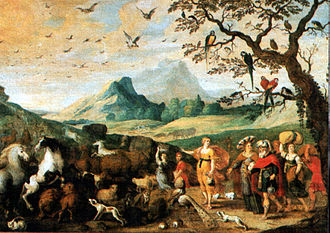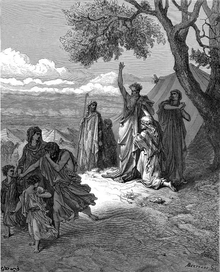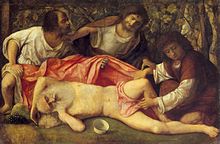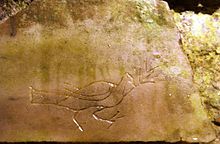Noah
![]()
Noah is a redirect to this article. For other meanings, see Noah (disambiguation).
Noach or Noah (more rarely Noé or Noe; Hebrew נֹחַ Nṓaḥ "rest"; Greek Νῶε Nôe; Arabic نُوح Nuh, DMG Nūḥ) was, according to the Book of Genesis (1st Book of Moses) of the Bible, the tenth forefather after Adam. Because of his faithfulness, according to biblical tradition, he was chosen by his God to survive the Flood by building the ark with his family.
According to Genesis 10:1-32 EU, it is to Noah's three sons Shem, Ham and Japheth that the division of mankind into the three distinct nations known at that time goes back.
In the genealogical sequence of the Bible, Noah is also the tenth ancestor of Abraham, which results in his traditional placement in the early 3rd millennium BC.

Hans Jordaens: Noah's entry into the ark
Noah in the 1st Book of Genesis (Genesis)
Family tree
| Adam and Eve | |||||
|
| |||||
|
|
|
|
|
| |
|
| |||||
| Set |
| ||||
|
| |||||
|
|
|
|
|
| |
|
| |||||
| Enosh |
| ||||
|
| |||||
|
|
|
|
|
| |
|
| |||||
| Kenan |
| ||||
|
| |||||
|
|
|
|
|
| |
|
| |||||
| Mahalalel |
| ||||
|
| |||||
|
|
|
|
|
| |
|
| |||||
| Jered |
| ||||
|
| |||||
|
|
|
|
|
| |
|
| |||||
| Enoch |
| ||||
|
| |||||
|
|
|
|
|
| |
|
| |||||
| Metushelach |
| ||||
|
| |||||
|
|
|
|
|
| |
|
| |||||
| Lamech |
| ||||
|
| |||||
|
|
|
|
|
| |
|
| |||||
| Noach |
| ||||
|
| |||||
Gen 5:3-29 EU
Overview
According to the book of Genesis Noah was the son of Lamech (Gen 5:28 EU). His name Noach or Noah may have been derived from the Hebrew word for rest/rest. At the age of 500 he begat his three sons Shem, Ham and Japheth. No information is given about their exact year of birth (Gen 5:32 EU). With Ham as the youngest (Gen 9,24 EU) the usual enumeration corresponds to the meaning for what follows.
All in all his age is given with 950 years (Gen 9,29 EU). With him the era of the first patriarchs ends, whose life span with the exception of Enoch was far more than 700 years. With the following generations the age decreased by leaps and bounds (see Biblical Age).
The Flood
According to the biblical narrative, the God YHWH wants to wipe out mankind because of its sinfulness, but took pity on Noah and his family because of his piety. In the ark, Noah is able to save himself, his wife, his sons and their wives, and many animals from annihilation by the Flood, thus ensuring the continuation of humanity and the animals on earth. The dove plays the role of glad messenger in the biblical Flood narrative: a dove left out by Noah returns to the ark with a fresh olive branch in its beak (Gen 8:11 EU). After the flood, YHWH gives humans unlimited dominion over all life on earth (Gen 9:1-2 EU). YHWH makes a covenant with Noah, promises there will never be another flood, and places the rainbow in the clouds as a sign of this (Gen 9:8-17 EU).
Similar mythological flood narratives have survived from many cultures. A particularly close relationship can be seen with the much older Sumerian-Babylonian Atraḫasis epic (c. 1800 BC) and its Flood hero Ziusudra, and with the Greek Deucalion epic (c. 1400 BC).
In the so-called "table of nations" of Genesis, the peoples known to the Hebrews at that time are traced back to Noah's three sons (Gen 10:1-32 EU; 1 Chr 1:5-23 EU): to Semites, to Ham the Hamites (dark-skinned Africans) and to Japheth the Japhethites.
Meat as food
Since all plants had died during the Flood, God explicitly allowed Noah and his descendants to eat slaughtered, i.e. bled meat, which until then - even though not explicitly mentioned (Gen 1,29-30 EU) - was reserved for God alone (as an offering). Now it says: "Everything that stirs and lives shall serve you for food. All this I give to you as the green plants. Only flesh with its life, its blood, you must not eat." (Gen 9:3-4 EU)
The cursing of Ham by Noah
According to the biblical narrative Noah is a man of the soil and the first mentioned planter of the vineyard (Gen 9,20 EU). The first mentioned tiller of the soil was already Cain according to the Bible (Gen 4,2 ELB).
Noah's son Ham discovered his father asleep in his tent, unclothed after drinking. He told his brothers Shem and Japheth about it, who then covered the father's nakedness with a cloth without looking at him. When the father awoke and learned what had happened, he cursed Ham's son Canaan and all his descendants to be servants of his brothers (The Curse on Ham). At the same time, Ham's brothers are distinguished by their father's special blessing because they had covered him up.(Gen 9:21-27 EU)
Most Bible translations into modern languages suggest that Ham happened to see his drunken father naked and that he cursed his son Canaan for it. The punishment for this, however, seems disproportionate and incomprehensible, so that as a rule, with varying emphases, Ham's handling of the events is interpreted as the actual transgression: he mocked his defenseless father instead of honoring and protecting him, as would have been his duty as a son.
Other modern interpretations identify the act through an analysis of the original Hebrew passage as a sexual assault; variants speak of voyeurism or incest with the mother, for which the exposure of the father's nakedness is only a representative image; against this background, the curse against the son as a consequence of the transgression and the severity of the punishment seem plausible. A common reading sees the offense in a homosexual act committed against the helpless father; it is already found in Jewish texts of the 5th century. Exclusively in old Jewish texts the view is found that the offense consists in a castration of the father.
The meaning of this passage is disputed; it has been variously interpreted whether the curse applied to Ham, who committed the transgression, or actually to his son Canaan. From this follow different interpretations as to which peoples are affected by the curse. It was used, for example, as a legitimizing figure for the God-given superiority of the Hebrews in the conflict with the Canaanites.
Some interpretations identify the descendants of Ham as Africans, which was later used by Christians to biblically justify the enslavement of black peoples.

Gustave Doré: Noah curses his grandson Canaan (left)

Giovanni Bellini: The drunkenness of Noah; the drunken Noah is discovered by his sons.

Stone tablet with dove and olive branch, Domitilla Catacombs, Rome
Noach in the Talmud: Noachide commandments
The Talmud derives from the biblical narrative the Noachide Covenant and associated seven Noachide commandments. According to Jewish understanding, these are bequeathed to all people and are therefore often laid out in the major religions.
A non-Jew who keeps the Noachide commandments can, according to Jewish understanding, attain a share in the world to come like a Jew. For this reason, from the Jewish perspective, there is no need for mission; other religions deserve respect as long as they, conversely, also respect Jewish identity.
Those who are willing to convert are even explicitly told that they can already stand before God by following the few Noachide commandments, whereas as Jews they have to fulfill all the commandments given to Judaism.
Search within the encyclopedia